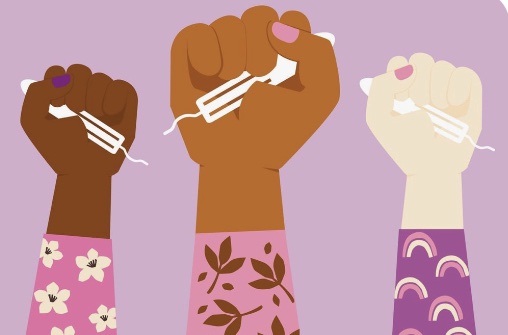Should menstrual products really be free?

Featured photo courtesy of Yoair Blog.
December 17, 2021
Since the beginning of their sale, menstrual products have been taxed as nonessentials and have required additional payment. In recent years, a debate has sparked over whether or not period products should be considered non-essential.
Starting January 1, 2022, Ann Arbor, Michigan, will become the first city in the U.S. to require free pads and tampons in all public restrooms.
Some cities require free menstrual products at specific locations, like homeless shelters and schools, but Mayor Christopher Taylor believes they should be accessible everywhere. “We, as a society, for too long, have not taken menstruation seriously. Access to menstrual products is a fundamental human necessity,” he said. “These products support basic human needs, and it’s long past time that we as a society acknowledge and respond to that reality.” The law was met with agreement by everyone in Ann Arbor City Council. Not to mention, period products will be provided in men’s restrooms as well.
Even more, Michigan Governor Gretchen Whitmer signed two laws last month removing the 6% tax on menstrual products. “If a person does not have regular access to these medically necessary products, it can be dangerous, even life-threatening, as well as increase the stigma associated with menstruation, especially for our young teens”, stated Gilda Z. Jacobs, President and CEO of the Michigan League for Public Policy Feminine.
We are aware that periods are a sensitive topic in many conversations. For the continuation of this article, we will be debating Michigan’s recent legislation. We will outline both arguments; for period products being free and against it. These opinions do not necessarily reflect the opinions of the writers or reflect the opinions of the Weddington Witness as a whole.
For Abolishing the Period Tax:
Periods are not something we, as women, choose to have; they’re a natural, biological process that cannot be controlled in any way. Periods are a key to life, as no human would exist if their mother didn’t menstruate. This leads to the question: why should we have to pay for period products? Imagine bleeding profusely from your reproductive organ for multiple days a week, multiple months a year, multiple decades — with no hygiene involved whatsoever. This is the life for 64% of menstruators in the world. In fact, the average woman spends over $18,000 on periods in their her. Why should period products be considered a luxury if almost half of the population relies on them?
Many menstruators have no choice but to wear the same singular pad every cycle. When you don’t change your pad multiple times a day, it poses a risk to vaginal infections and foul odor. For females with low reproductive hygiene, UTIs (Urinary Tract Infections) can easily find their way to them. If the kidney is damaged while having a UTI, one can die, too. In addition, when you don’t wear a pad or tampon at all, you bleed through your clothes, something that’s very hard to remove. You can remove blood stains from most materials through washing it with soap and water, but most women who don’t have access to period products also don’t have access to basic sanitation, like soap.
Stigma around menstruation is ingrained into our society. We are taught to be ashamed of ourselves for this natural process, and many mothers refrain from teaching their sons about this because the taboo is that strong, leaving many men to grow up with the wrong information about periods or even having no knowledge of them at all. In numerous cultures, especially in Southeast Asia, menstruators are told what they can and can’t do, as if they’re objects. In India, many menstruators are not allowed to enter the kitchen, take a bath, or even eat certain foods. This leads girls to grow up thinking that their period is sacrilegious and disgusting, giving power to the government to dictate price and distribution on period products. The longer we continue this, the more the deprivation will increase. This is why breaking the social and cultural stigma of periods and educating both young boys and girls around the world on the truth of periods will provide a better understanding of them, thus being the best way to lead to a revolution of free, accessible menstrual products.
Speaking of ridding the stigma, at Weddington High School, we have a club dedicated to menstrual inequity: Girls in Charlotte. At Girls in Charlotte, we fight gender inequality, stereotypes, roles and expectations, but we also work to make periods a normalized topic in our school and region and provide low-income menstruators in the Charlotte area with what they need to get through their cycle. We have meetings on a monthly basis where we have a group discussion about different issues relevant to women and announce volunteer projects. Anyone, regardless of gender, is welcome to join. To join, please text @whsgic to 81010.
Against the Abolition of Period Tax:
What defines “essential”? To most, essential products are those that humans cannot live without. This would include food and water, not period products.
There is an entire population that does not require period products at all, whether or not they are essential. Those without female reproductive organs do not menstruate, and there are statistically more men in the world than women. This does not take into account the women that do not menstruate, whether that be due to biological deficiency, physical trauma, or other bodily inhibitors.
Furthermore, in taxing these period products, the government is able to generate revenue for a market that is consistent. 6% tax on period products is a small price to pay, especially in a country where the poverty line lies above the international average and where our national debt is constantly increasing. Dominika Miszewska, a medical student in Warsaw, and Julia Żuławińska, a biophysics student, created the OmniCalculator, a calculator that determines the cost of period products. They found that the average woman spends about $9 a month on period products, including the tampon tax. Any number, if added enough times, can amount to a great price. This is why “yearly spendings” on period products can be misleading. $9 a month is a small price to pay, and can amount to about 29 cents a day for periods, which, for most females, only happen once a month.
Plus, if there’s an argument for free period products, there’s an argument for free birth control. Where does the government draw the line on luxury taxes? If period products are non-luxury items, what else could be?
Conclusion
As one can see, there are interesting points made on each side. Only time will tell the future of the period tax, but it is clear that lawmakers have already taken a new step in the direction of menstrual product equality.









Sophie Drobnick • Jan 25, 2022 at 1:19 pm
I love this take on period products and totally agree that this should be implemented.
daniela Miranda • Dec 19, 2021 at 9:38 pm
i 100% stand with period products are essential and they should be free, point blank period